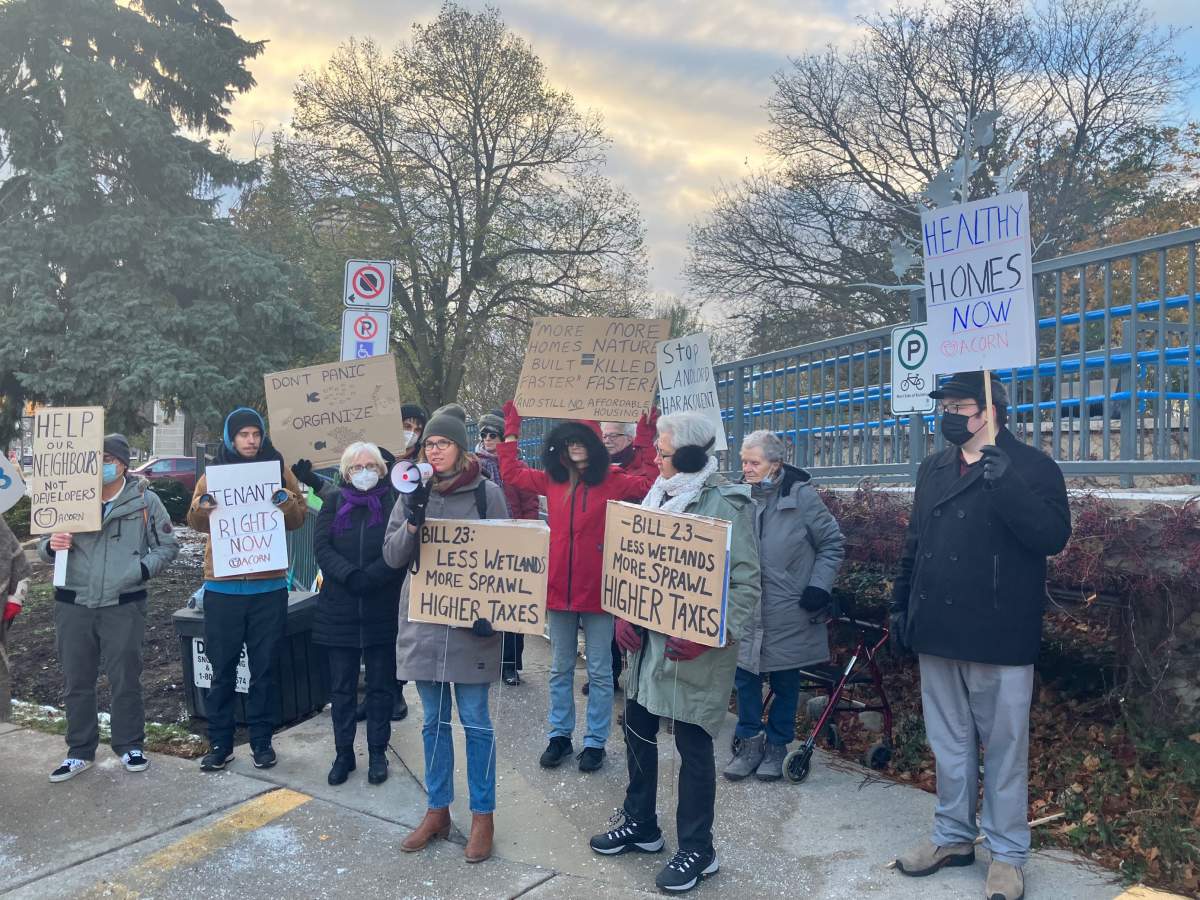Tenant advocates in London, Ont., were joined by local politicians on Friday to rally on the front steps of city hall and voice their concerns with new housing legislation from the provincial government.

Introduced last month, the bill looks to spur new home construction by reducing development charges, allowing more units on one residential lot, and pursuing rent-to-own programs, as well as numerous other measures and changes.
Bill 23, or the More Homes Built Faster Act, takes aim at the province’s housing crisis, with the Doug Ford government having promised to build 1.5 million homes in 10 years.

Friday’s rally was organized by London ACORN (Association of Community Organizations for Reform Now), the local chapter of a national tenant advocacy group.
London ACORN leader Claire Wittnebel says, “Despite the name that the Ford government gave this bill, it does not create affordable housing and it does not help with the housing situation that Ontario is facing.”
The reason why, Wittnebel says, is because the bill would “dramatically constrict the municipality’s powers and resources to build and protect affordable housing.”

Get daily National news
Wittnebel points to new limits on inclusionary zoning bylaws, which cities can implement to require developers to make certain proportion of new units affordable. Bill 23 would set this proportion at no more than five per cent, with affordable housing defined as units with rent “no greater than 80 per cent of the average market rent,” a measure that Wittnebel says is not affordable.
“The timeline of keeping that unit affordable would only be 25 years, so that’s not even within the lifespan of one tenant,” Wittnebel said.
Wittnebel says the bill will also threaten rental replacement bylaws, which are in place in Toronto and Mississauga. These bylaws provide protections to tenants whose homes are redeveloped, such as allowing them to rent a unit at the same price after the redevelopment.
Ward 11 Coun. Skylar Franke says if the bill passes, “it will be one of the biggest tax burden reallocations since the provincial downloads of the ’90s.”
Franke’s concerned about the reduction of development charges, which are fees municipalities place on developers for new builds to help pay for city infrastructure such as roads, transit and wastewater systems.
“Of course, if it moves forward, it means the city will have to increase property taxes to cover these costs.”
Franke says city staff are working on a financial impact assessment specific to London, but a preliminary analysis from the Association of Municipalities of Ontario (AMO) found the legislation would cut $5.1 billion in funding to municipalities across the province over the next nine years.
As for the transfer to taxpayers, AMO said in its preliminary analysis that the bill “indicates the transfer of up to $1 billion a year in costs from private sector developers to property taxpayers without any likelihood of improved housing affordability.”
In response to AMO’s analysis, a spokesperson for Municipal Affairs and Housing Minister Steve Clark told the Canadian Press that Ontario is working with the federal government to secure support for municipalities to pay for critical infrastructure.
“The province estimates that across Ontario, municipalities have $9 billion in unspent development charge reserves,” wrote Victoria Podbielski in a statement to the Canadian Press.
The former executive director the London Environment Network, Franke has a laundry list of concerns for the bill’s ecological impacts, including significant reductions to parkland requirements for developers.
“I know during the campaign, in Ward 11, a lot of people wanted to see more parks and recreation, so this will do the opposite,” Franke said.
“As well as conservation authority changes, asking them to produce a list of the land that they control to see if it can be developed, pulling land out of protection in the Greenbelt area, removing wetland protections … no longer recognizing species-at-risk as part of their view process. Those are just four of a long list of environmental impacts.”
Franke was one of several city councillors attending Friday’s rally, which also saw appearances from Ward 1 Coun. Hadleigh McAlister, Ward 6 Coun. Sam Trosow, Ward 7 Coun. Corrine Rahman and Ward 13 Coun. David Ferreira. London West NDP MPP Peggy Sattler was also in attendance.
— with files from The Canadian Press’ Allison Jones.












Comments